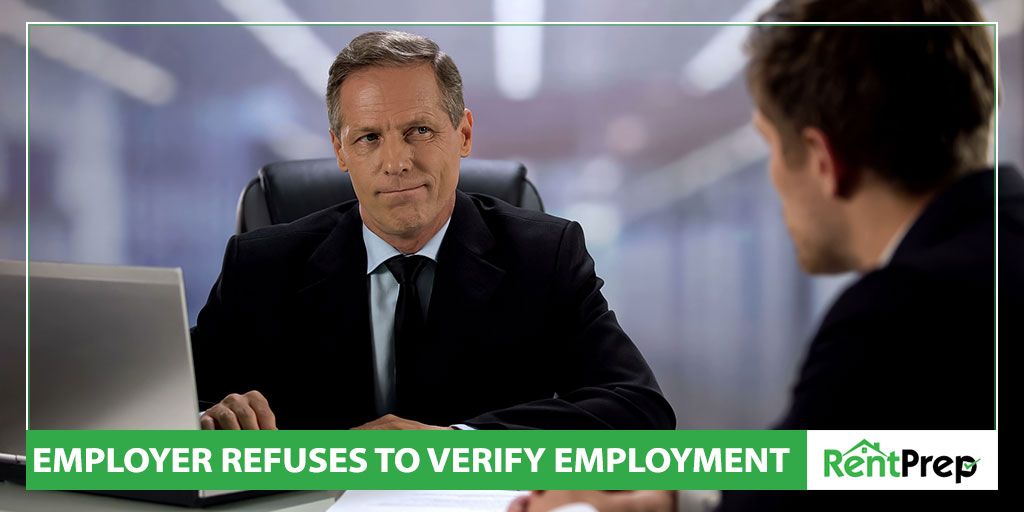
Updated January 2022
Screening tenants is one of the most critical parts of the rental process. Are you missing any important steps in your vetting process?
Many landlords incorporate employment verification, but what can you do when an employer refuses to verify employment?
When you decide to run a background check on a potential tenant, it’s always good to obtain verification of their employment to ensure they are being honest about their job and income. While not typical, it is possible that a potential tenant has lied about employment on their application.
In some instances, however, the employer refuses to verify employment due to their company policy or their own personal beliefs. To circumvent this issue, you need to be prepared to get creative while approaching employment verification requests. Today, we’ll review what to do in this challenging situation.
Table Of Contents: Verifying Employment
When you’re screening tenants, you want to ensure that you are taking time to check if they can afford to rent your unit for the lease period. The exact amount you expect them to meet may vary, but you should take time to check their income and employment status before signing a lease agreement.
Here’s where you can get started when an employer won’t verify employment:
- When An Employer Refuses To Verify Employment: What’s Next?
- Taking Employment Verification Into Your Own Hands
- Employment Verification FAQs
- Can a landlord ask for proof of employment?
- Do employers have to do employment verification if they don’t want to?
- When must an employer respond to a verification of employment?
- What can an employer say in an employment verification?
- Why would you need proof of employment?
- Who would call to verify employment?
- How long does it take to verify employment?
- What information is needed for employment verification?
- Remember The End Goal
When An Employer Refuses To Verify Employment: What’s Next?

There are some situations where the employer listed by an applicant will refuse to verify their employment. While not typically done for nefarious reasons, it is impossible to know the basis of this refusal. That can lead to questions about the applicant’s honesty and lead to uncertainty when determining whether or not they are a good fit for your rental unit.
Believe it or not, this happens quite a lot when calling employers for verification of employment. Sometimes the conversations go something like this:
Landlord: “John Smith filled out a rental application to rent my apartment. I need to verify his employment as part of my tenant screening process.”
Employer: “Sorry, but I can’t give you any information.”
Landlord: “Well, can you point me in the right direction?”
Employer: “No, I’m sorry.”
Other times, they will try to charge you a fee of $15-20 and won’t release any information until that is paid.
Why Employers Refuse Verification Requests
There are several reasons why employers might not want to respond to an employment verification check. Some of these reasons are better than others, but that doesn’t mean you won’t see them from time to time.
Some companies have a policy of not providing references, and this may include employment verification letters. This type of policy is usually adopted whenever privacy is a concern, as the company does not want to risk compromising their security or that of their employees. So they only provide employment verification when required by law.
On the less professional front, it is possible that an employer simply did not like the employee or is upset with them for some reason. Out of spite, they choose to refuse the verification. While not kind, this is within their rights as long as there is no legal requirement to provide employment verification letters in that region.
Making Verification Simple
Some employers may ignore requests for employment verification simply because they do not know what to write and don’t have the time to think about it. To reduce how often this happens, it might be beneficial to create your own tenant employment verification form that can be given to these companies.
Many HR departments have their own version of this form, but having one on hand can streamline things with businesses that are unfamiliar with this type of verification.
The form doesn’t need to include more than space for the following information to be inserted:
- Full name of the applicant
- The job title(s) held during their work history
- The dates of employment
- Their current salary, if applicable
By providing a template for this letter upfront, you can cut down on the time it takes to receive a response about a potential tenant’s work history.
Taking Employment Verification Into Your Own Hands
If an employer is uncooperative or just doesn’t have the answer to what you’re looking for, it’s a good idea to verify your applicant’s employment on your own.
While this isn’t the ideal way to move forward, it is possible to utilize a few different methods to find out whether or not your tenant can afford to rent a specific unit. It might be tempting to skip the income verification altogether, but that’s never a good idea.
Instead, consider one of the following methods as an easy and direct way to find out about the applicant’s employment without involving the employer directly.
#1: Have Your Tenant Provide Proof Of Income
When trying to verify your rental applicant’s employment yourself, it’s a good idea to ask the applicant for the following documents:
- A copy of their pay stubs (ask for multiple pay stubs for income verification purposes)
- A copy of an earning statement
If they supply you with this information, be sure to look at it carefully and never assume it’s always 100% factual.
Look closely to be sure they didn’t use Adobe Photoshop and that it looks authentic. Believe it or not, tenants lie on rental applications from time to time.
It never feels good to assume an applicant might be lying, but this is the point of the rental application process. You want to be sure that all of the information you are viewing is accurate in order to make your decision based on facts.
It is also up to you to spot any differences between what the pay stub tells you and what the applicant has told you. You are no longer relying on the answers of the supervisor or human resource manager.
For example, you may be able to find some discrepancies. The easiest thing to notice is the number of hours worked. If they say they work full-time yet are only being paid for 15 hours of work per week, there’s a good chance they are lying to you.
#2: Ask For Bank Statements

When all else fails, you can never go wrong by asking for bank statements. This will depend on the market and whether the property will attract people ready and willing to share this information.
While it’s typically not illegal to request bank statements, it’s best not to require them as your primary income verification method. Many applicants may be uncomfortable with this, which can lead to you having a bad reputation as a landlord in your community.
However, regardless of your market, you should never accept this answer: “I don’t have a bank account.” This is a huge warning sign!
Why? Because most everyone has a bank account. Besides, if they don’t, how will they pay their rent every month?
#3: Bring In A Third-Party Service
Another effective way to work through the verification process of screening tenants is to work with an accredited screening service. Many services offer assistance in verifying applications through background checks and other useful means. If you find it difficult to handle these steps yourself or simply don’t have time for thorough vetting, it’s time to hire some assistance.
Here at RentPrep, we offer a unique income verification service that can do just what you need. Our system verifies income and allows for non-traditional earners such as freelancers to more accurately report their earnings.
Consider giving our income verification service a try today. You might be surprised at how much time you can save and stress you can avoid by simply getting some additional help today.
Employment Verification FAQs
We often receive questions around what information can be released for employment verification. Here are a few of the most popular questions.
Can a landlord ask for proof of employment?
When choosing a tenant, landlords are permitted to request proof of employment or the information necessary to complete their own employment verification check. This is because they have a right to ensure the tenant has the income to reasonably afford to rent the property.
If a potential tenant does not wish to disclose their income or their employment information, a landlord is permitted to deny their application.
Do employers have to do employment verification if they don’t want to?
Unless legally required, employers are not required to fill out employment verification letters for past or present employees. Companies that prefer not to provide these verification letters will often include that information as part of their employee contracts, but not everyone is aware of this.
Employment verification letters, rather than full-blown references, are more likely to be completed by employers because they require less time.
When must an employer respond to a verification of employment?
There are two situations where an employer will be legally required to respond to requests for a verification of employment:
- When they receive a federally backed request, such as a request from a federal loan institution, to verify an individual’s employment
- When state or local law require them to do so, and the request was submitted according to the guidelines of said law
In all other cases, it is within an employer’s right to deny this type of request at any time. Most employers will comply with the request, but not all employers will want to release information about their employees, their salaries, and other related information.
What can an employer say in an employment verification?
To understand what an employer typically says in an employment verification letter, it’s important to point out the difference between an employment verification letter and a reference letter.
An employment verification letter confirms or denies that an individual was or is employed at a specific company. On the other hand, a reference letter typically includes more detailed information that commends the individual’s accomplishments at the company.
In most situations, an employer can include whatever information they want in an employment verification letter.
At the bare minimum, an employer should say when the individual was employed at the company and what their role was. Some will also include their salary and a short statement about their standing when they left the company. However, nothing beyond the actual verification of their income and employment is needed.
It is best if employers do not include anything subjective, as this is meant to be a straightforward verification. For more details, a reference letter should be requested from the appropriate individuals.
Why would you need proof of employment?
Some people have never had to collect or review an employment verification letter before. That’s because there aren’t a lot of situations where these forms are needed, and the use of these letters is relatively restricted to financial concerns.
Employment verification letters are typically required in the following situations:
- For a job application: New employers may request this type of letter during the hiring process to ensure that you held a previous position listed on your application before giving you a job offer.
- For loans: Financial institutions want to confirm your income via employment verification. This enables them to avoid offering loans to those who will not be able to repay them.
- For reducing loan payments: Individuals struggling to make monthly loan payments may request a reduction. The loan provider is likely to ask for employment verification to confirm income and make the necessary adjustments.
- For renting property: Landlords like yourself often use employer verification to check that a rental applicant is honest about their situation while also confirming that they can afford the monthly rent.
- For legal issues: Individuals involved in child-related or marriage disputes may need to prove their employment and income to assist in the final verdict determination.
Most companies are familiar with the process of sending out employment verification letters, but there may be some hesitation in small businesses that aren’t often asked for these documents. Work with applicants to find a way to verify employment when in these tricky situations.
Who would call to verify employment?
Ultimately, it is up to you to dictate who will call to verify employment once you receive a rental application. It should be done by someone qualified and trained in screening procedures, as the applicant’s privacy mustn’t be put at risk.
In most situations, the landlord or their property manager will be the one to call and verify employment. Otherwise, it might be a broker or a third-party service that you hire to do the screening work on your behalf.
How long does it take to verify employment?
In most situations, employment verification should take less than three days.
Employment verification can happen immediately if you or your team can contact the employer or their HR department and receive an immediate response. In other cases, they may ask you to submit a formal request, and then it will be returned to you.
Regardless of which approach you take, it shouldn’t take more than three days to get a response. If you are still waiting after this time, it’s a good idea to follow up and make sure your request hasn’t been missed.
What information is needed for employment verification?
When calling for employment verification, you may be able to receive a quick answer on whether or not someone is employed there by simply asking. This is especially true if you are contacting a small business or a local shop familiar with the area.
When it comes to larger companies or those that have more procedures in place to ensure privacy is upheld, you might need to take a few more steps. Generally, you need to have the name and phone number of the applicant and an authorization form signed by the applicant. Alternatively, the HR team may take time to call the applicant and ensure they are permitted to release information before answering your request.
Remember The End Goal
As you work to verify employment and determine if renting to a specific applicant is the right move, it can be easy to get caught up in the details. The details, however, are not the most important part right now. Your end goal is income verification for the apartment’s rent, not to get employment verification.
If you get stuck on an employer that refuses to verify employment for one reason or another, get creative as you confirm the applicant can afford the unit. It can be a frustrating step in the process, but it is necessary if you want to be sure you are choosing the right tenant. Just as you wouldn’t skip other steps of the process, you don’t want to miss this one.
Take your time—don’t rush. Remember what your end goal is, and you’ll be able to get there in due time.

